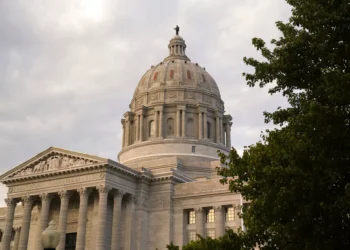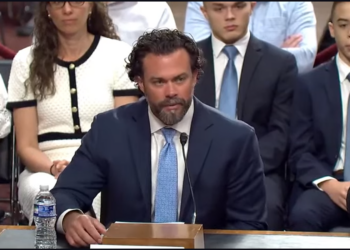Amid all the trouble leftist “entertainment” and “news” outlets are having trying to stop their market share hemorrhage, as Douglas Andrews wrote, one of their icons has fallen: “Stephen Colbert, the inveterate Trump-hater and longtime host of ‘The Late Show’ on CBS, has been canceled by the network.”
Colbert, pronounced around our shop as “Cole-Burt,” was protesting a $16 million libel settlement that CBS paid to Donald Trump, calling it “a big fat bribe.” But CBS has been losing $40 million a year on Colbert’s Trump Derangement Syndrome vendetta in support of the Democrat Party.
With an assessment of Colbert’s downfall and the politicization of late-night shows, enter Jay Leno, the 1992 successor to Johnny Carson as the host of “The Tonight Show,” and the most successful late-night TV funny man since Carson. Like Carson, Leno built a very large audience on good humor, and as it related to politics, it was balanced.
In a recent interview, David Trulio asked Leno about a study of his humor, finding that his “jokes were roughly equally balanced between going after Republicans and taking aim at Democrats.”
Leno responded: “It was fun to me when I got hate letters [like] ‘Dear Mr. Leno, you and your Republican friends’ and ‘Well, Mr. Leno, I hope you and your Democratic buddies are happy’ — over the same joke.” Leno said, “Well, that’s good, that’s how you get a whole audience.”
Notably, we sometimes see a similar split over an article regarding President Trump — some readers complaining we are “too pro-Trump” and others that we are “too anti-Trump.”
Of the political bias in some shows, including Colbert, Leno says: “Now you have to be content with half the audience because you have [to] give your opinion. … I like to think that people come to a comedy show to kind of get away from the things, you know, the pressures of life, whatever it might be. And I love political humor, don’t get me wrong, but it’s just what happens when people wind up cozying too much to one side or the other. … I don’t think anybody wants to hear a lecture.”
Trulio noted how the balanced “approach worked in the marketplace,” and indeed it did.
Leno responded: “Well, why shoot for just half an audience all the time? You know, why not try to get the whole audience? I mean, I like to bring people into the big picture. I don’t understand why you would alienate one particular group, you know, or just don’t do it at all.”
I think the “half audience” answer is that in post-modern late-night TV comedy, show hosts, like so many other celebrities buoyed by their sycophantic echo-chamber audiences, believe they are both omnipotent and omniscient, and thus, whatever they opine must be received as divine inspiration. Over the last decade, half-audience market shares have become the objective, and that formula worked after Trump’s first election. Trump was good for late-night leftists, and likewise, for CNN, and readership at the Washington Post and The New York Times.
As with Colbert, it appears that Jimmy Kimmel, Seth Meyers, and Jimmy Fallon are all banking on that formula working for Trump’s second term. A Media Research Center study of late-night shows found that “99 percent of their political guests were on the left, matching the result for the last six months of 2024.”
But when market share begins to decline based on political shifts in public opinion, that inevitably results in revenue problems for those who are stuck in the opposing ditch. That is certainly the case with broadcast news outlets, which are dying on the vine.
Only one comedic late show host, leftist Bill Maher, seems to have figured this out. His programs often included segments of blazing criticism of Demos and the cultural left.
The market share driven by anti-Trump hysteria is not going away, but much to the shock of Democrats and their Leftmedia publicists, their demonization of Trump is meeting more resistance, and it is showing up in their revenue numbers.
Semper Vigilans Fortis Paratus et Fidelis
Pro Deo et Libertate — 1776
















